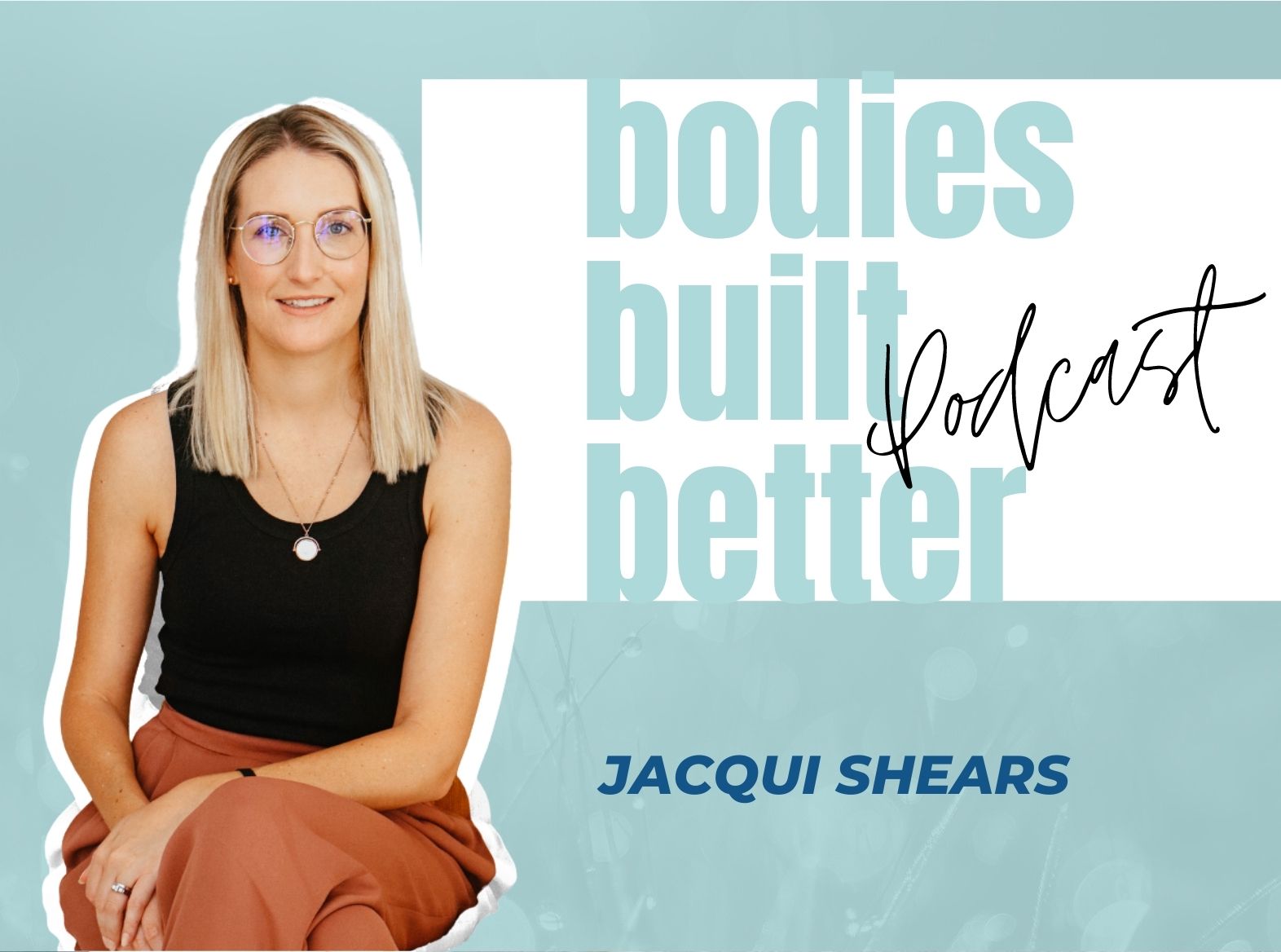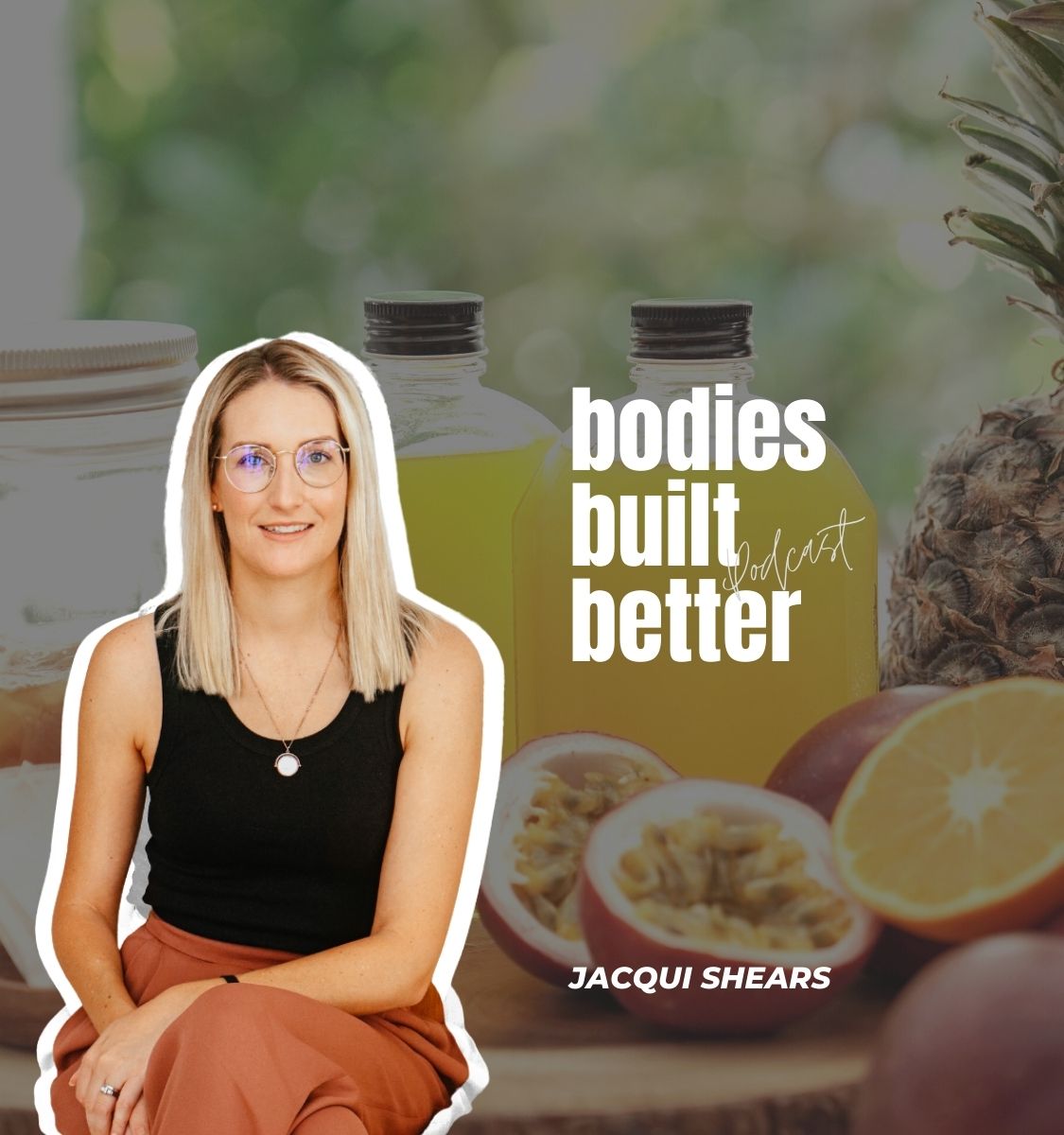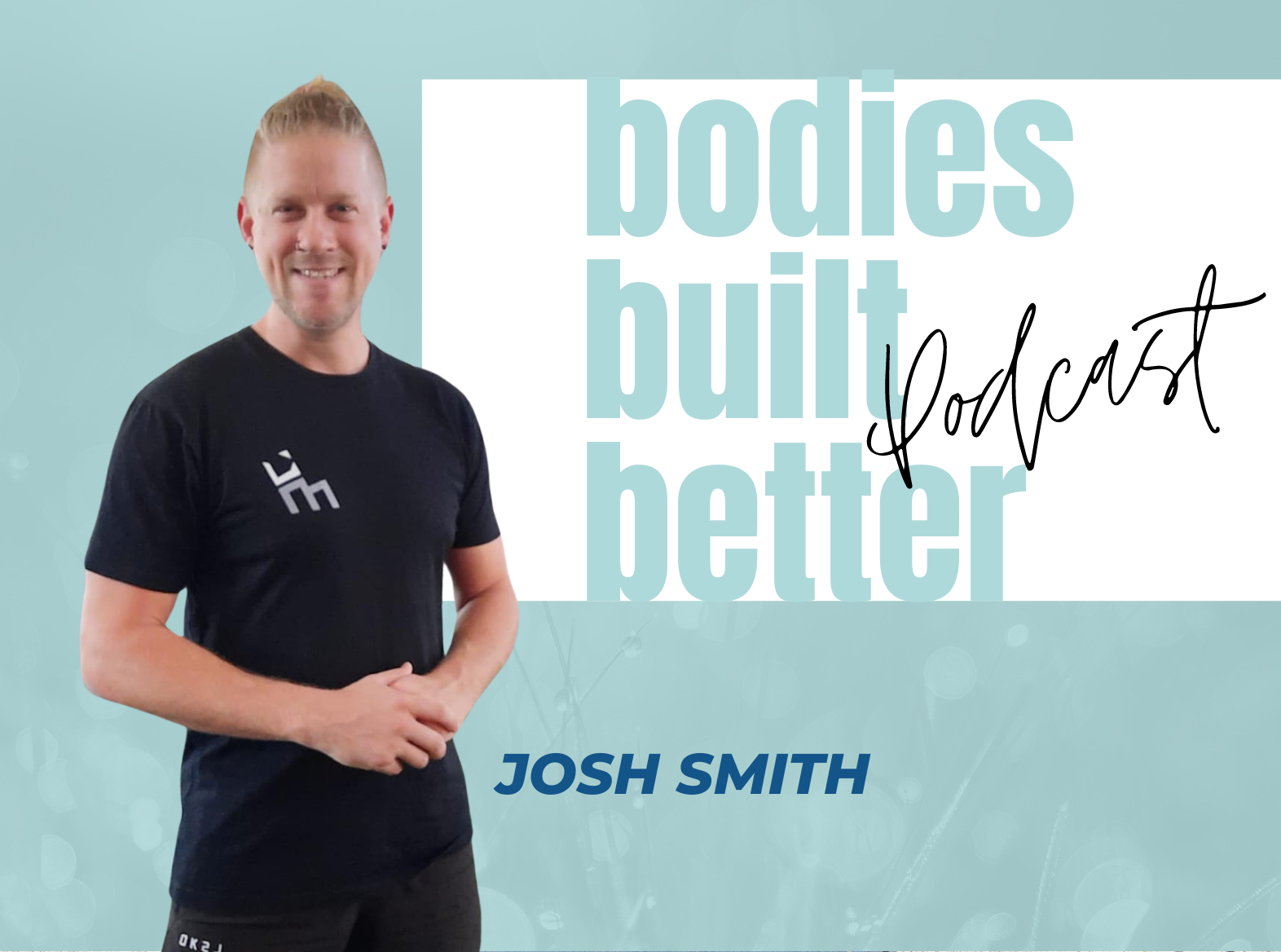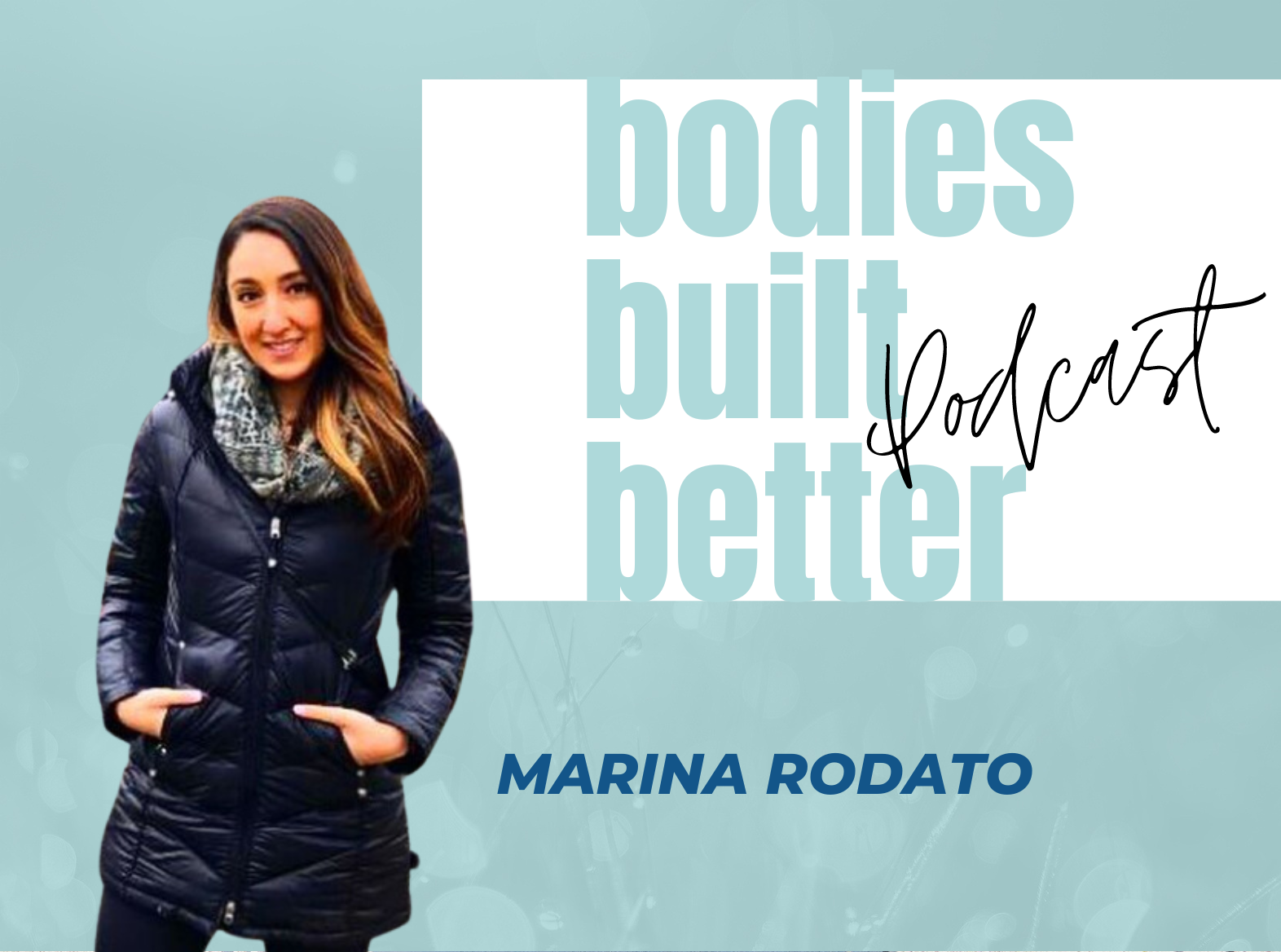Jackie 2:02
Jacqui, thank you so much for chatting with me today. Welcome to the Bodies Built Better podcast.
Jacqui Shears 2:08
Thank you for having me. It’s so great to be here and finally meet.
Jackie 2:12
I know, following each other on Instagram, it’s very cool. And this happens. You get to finally speak in person, well, like “person through a screen.”
Jacqui 2:24
It’s been great. I mean, I consult typically online through Zoom anyway. So it’s pretty natural to do and meet this way.
Jackie 2:33
Well, speaking of consults, you speak about gut health, you’re a nutritionist, and I’m really pumped to talk about gut health because I feel like it’s a topic that can get really over-complicated. And there are so many companies out there that, you know, are out there selling their superfood powders and this supplement and that and, and sometimes I think it’s best to really get back to basics. So I’m looking forward to chatting about all things gut health with you today. But before we get started, I’d love to know your journey because I know you have a gut health journey that got you into this.
Jacqui 3:19
Yeah, absolutely. It was actually my son’s diagnosis with celiac disease when he was five that kind of got me interested in this field and made me study this degree. So medical science is my background. And that kind of was the catalyst initially for starting that so he started presenting with brain fog. He was at school, he was unable to read that it was all going backwards. He was tired all the time, even though he’s sleeping like 11 hours a day, or at night, and then he was bruising really easily as well. So we knew that something wasn’t right. And fortunately, we had a really good GP at the time. And they picked up that diagnosis quite quickly, which made it a lot easier. Not everybody is that fortunate. And so then I feel like a few years later, I started studying and it all kind of went from there and here I am. So [I’m] out practising as a nutritionist, but yeah, a little bit broader than that. Because of my medical science background, there’s a lot more to it, and things that I can help with. So gut health is one of my passions and things that I like to really help with, because I think it is a cause for a lot of issues that I see in women that I am treating and if we’re not looking at that, and especially their diet, we’re really not addressing the root cause so [that’s] why I do what I do.
Jackie 5:00
Can you tell us for a second what is celiac disease because I feel like we hear all these terms and don’t really have an understanding of what they are and how they can affect us.
Jacqui 5:13
Yeah, so it’s an autoimmune condition, iit affects approximately one in 70 Australians. So it’s not all that common. But what it is, is it an issue absorbing or it’s a reaction to the gluten protein. So people with celiac disease need to steer away from gluten for their whole life, there is no cure currently for that. And so that’s why things will be labelled gluten free, but they’ll also be like a “may contain” statement on the back of some foods, they also need to steer away from too. So when they ingest gluten, it sets off that immune response. So they’re getting a lot of inflammation within the gut. And that can hinder absorption of key nutrients. So we typically see them present with things like low iron, B12, vitamin D, which is particularly important because then we see issues with calcium absorption. And so they can have tooth enamel defects, they can have issues with bones breaking like my son did. So yeah, that’s kind of another thing, how we pick that up. But yeah, so it’s quite fascinating, again, because there’s so many different symptoms that people can present with. It’s not always the typical, like gastrointestinal, like bloating and pain. Some people wake up in the middle of the night, they can have insomnia, they can have aching legs, there’s brain fog, issues with bowels, obviously, they can be really, really quick, [or] really slow, it does affect everybody differently. And then some people have no symptoms at all. And we just pick it up through, you know, progressively having lower iron. So, yeah.
Jackie 6:52
And when you found that out, how long did it take before? You know, you started seeing the difference in him? You know, after having changed diet?
Jacqui 7:07
Well, initially, I guess for him, it was probably four full weeks, we started to see changes within his skin and his face is looking a little bit brighter, those dark circles under his eyes were improving. But overall, then we started to see things like he’s running. So cross country, that improved. That took about 12 months. The year before he came second last, and then he came fifth the next year. We saw those big changes in performance, which is great. And he was only six at the time, so quite young. And now it’s something that we manage, and he plays basketball and things like that. We’ve still got to be mindful of diet, which I particularly like working with athletes, as well, because there’s so many things that we can do there to improve performance, just you know, looking at the specifics of their diet, and maybe conditions that they might have or might be prone to developing.
Jackie 8:07
So let’s get down to basics. What is the gut?
Jacqui 8:17
Well, it’s the biggest organ that we have in our body. So it’s the whole gastrointestinal tract. Yes. So from our mouth all the way through. It’s very, very important. Essentially, what we’re using it for is for digesting food in a very small nutshell, and absorbing food and then excreting it. It is a lot more complex than that. So for majority of people, so it’s not always what goes in there and comes out, we’ve got to be a little bit more specific look at, if there are absorption issues, if you have any underlying deficiencies there, and things that we can tailor food to to help you know with your with your gut and make sure that that is optimal.
Jackie 9:03
Okay, so what is good gut health, and why is that important?
Jacqui 9:10
Oh, well, it’s important for overall health. So everything from performance, if you’re sporting inclined, immune health, obviously as well. And what else have we got? Like I said, that overall health. So if we have a happy, healthy, balanced microbiome, then everything kind of functions well, we have good hormonal production. So everything there is, we don’t have issues typically with metabolic disease. So it really does underlie a lot of key things there.
Jackie 9:49
And you mentioned that the gut starts from the mouth of the top end. So tell us more about that digestive process, and yeah, break that down for us.
Jacqui 10:03
Yeah, so obviously, when they say you eat with your eyes, so what we’re seeing first, but–
Jackie 10:09
I do that too often and end up too much on my plate, like, my eyes are way bigger than my stomach.
Jacqui 10:17
We are all guilty of that. Absolutely, it’s always the good things that get us too. But yeah, like you do it, that kick starts that digestive process, it gets those salivary glands working, you know, we’re hungry, we get that appetite building up, and then obviously, we’re ingesting, so we’re chewing, we’re breaking those foods down. And then as it moves, you know, further down the gastrointestinal tract, we start to break down that food. So we see those chemical reactions start to occur and things start to be absorbed into the bloodstream and then passed out the other end, so it doesn’t have to be that complex. I don’t know, it does depend on who I’m working with. If we really delve into it that deeply or not, people sometimes just like to understand the basics of it and I guess, learn a little bit more about their condition. And you know, what’s important to them?
Jackie 11:21
Well, it is really complex. When we’re talking about digestion, you know, what can disrupt that entire process?
Jacqui 11:36
A lot of the common ones that I see, so again, so your microbiome imbalance, so an imbalance there within like gut health, bacteria, things like medications, so that can range from antibiotics, if you’ve been recently unwell or you are finding yourself unwell quite frequently, and you have that recurring. You know, antibiotic use, non steroidal anti inflammatories are quite a big one there as well. And they’re quite common for a lot of people and then some of the others. So like an antidepressant, again, is becoming more and more prescribed. And over time, we do see some key nutrients changed and things like B12. I like to keep an eye on again, I and and things within the gut with those, otherwise, we’ve got things like parasites, obviously food intolerances, if you’re prone to those and not understanding, you know, the symptoms that you may be getting from those foods that you’re ingesting, and then lack of variety in diet and that’s a that’s a big one, as well. So sometimes people, they’re reacting to foods, so they’re just excluding it from their diet completely. But also, we also have people who just don’t eat those foods, they might not like them, or they’ve never grown up with it in their diet, or, you know, they might be following a plan through you know, another professional or someone at the gym, and it’s quite restricted, you know, so they’re having like a sweet potato and broccoli and chicken or steak, like it’s just quite repetitive. So and you know, that can also be detrimental for the gut if, regardless if they’re still good foods, but we’re lacking that variety there. So yeah, it’s quite broad. There’s a lot of things that can go on. It is different for everybody, depending if you do have issues with it or not, and stress–I didn’t mention stress, that’s a huge one as well.
Jackie 13:28
Yeah, we’ll get to stress in a moment, because that’s a big topic. That’s one thing for me in terms of that variety because I am such a routine person and as soon as I find something that works, literally having the same meal every night, and I realised now that you know that’s also not good, even I’m having my broccoli and cauliflower and some carrots, brown rice. It really needs a variety.
Jacqui 14:06
Yeah, and I find the variety’s easier in summer. It’s–no, that sounds really bizarre but because we typically have lighter meals so we’re having a lot more salads you know with on a barbecue typically I find up here in North Queensland but it’s an easy way to mix it up. We can use different leafy greens, we can add in vegetables, we can add in more capsicum and cucumber and red onion you know all these other good foods, and then add meat on top of that so there’s so many great ways to add get that variety in I find in summer over winter because you said that they have those hearty meals you stick to the staples like your potato, your carrot, broccoli, cauliflower. And so sometimes you just miss some of the green so have a really good loaded salad recipe which I love. So you can still have those like key veggies, roast them up and have them you know, mix them through the greens as well and have it with the meat. It’s fantastic, and you’re getting a lot more plants on your plate, then they just meat and veg. So that’s a good way to do [it].
Where to find Jacqui:
Website: https://www.integrativehealthobjective.com.au/
Instagram: @tiho.nutritionist
Instagram: @theintegrativehealthobjective



